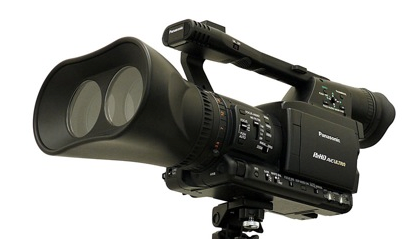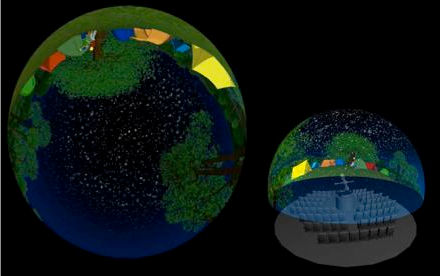Panasonic stellt 3D-HD-Kamera vor
Auf der NAB 2009 hat Panasonic ein komplettes 3D-System von Aufnahme bis zur Präsentation vorgestellt. Aufbauend auf dem Flashspeicher basierenden P2-System fällt besonders der mit einem Doppelobjektiv versehene Camcorder auf. Letzterer wirkt deutlich eleganter als diverse 3D-Bastellösungen, bei denen meist zwei Kameras auf einer Schiene befestigt wurden, um parallel zwei Bilder aufzunehmen.

Für das Anzeigen der Videos plant Panasonic die Herstellung eines 3D-Plasma-Displays. 3D könnte auch der Blu-Ray einen Schub geben: Die Scheiben bieten genug Platz für einen zweiten Videospur, nicht kompatible Player spielen dann eben nur eine Spur ab und zeigen somit den Film in 2D. Als Alternative zum Plasma-Display bieten sich Shutterbrillen an, aber 3D-Filme werden sicher erst dann den Massenmarkt erreichen, wenn sich Zuschauer keine spezielle Brille aufsetzen müssen.
An 3D-Technik wird bereits seit Jahren geforscht, alle paar Jahre versuchen sich Fernsehsender an Sendungen mit 3D-Szenen und verteilen dafür Pappbrillen. Die derzeitigen Bemühungen der Industrie sind aber deutlich vielversprechender. Pixar hatte beispielsweise letztes Jahr angekündigt, Animationsfilme beginnend mit "Up" sowohl im 2D- als auch 3D-Format zu veröffentlichen.

Für das Anzeigen der Videos plant Panasonic die Herstellung eines 3D-Plasma-Displays. 3D könnte auch der Blu-Ray einen Schub geben: Die Scheiben bieten genug Platz für einen zweiten Videospur, nicht kompatible Player spielen dann eben nur eine Spur ab und zeigen somit den Film in 2D. Als Alternative zum Plasma-Display bieten sich Shutterbrillen an, aber 3D-Filme werden sicher erst dann den Massenmarkt erreichen, wenn sich Zuschauer keine spezielle Brille aufsetzen müssen.
An 3D-Technik wird bereits seit Jahren geforscht, alle paar Jahre versuchen sich Fernsehsender an Sendungen mit 3D-Szenen und verteilen dafür Pappbrillen. Die derzeitigen Bemühungen der Industrie sind aber deutlich vielversprechender. Pixar hatte beispielsweise letztes Jahr angekündigt, Animationsfilme beginnend mit "Up" sowohl im 2D- als auch 3D-Format zu veröffentlichen.
blog comments powered by Disqus
Industries First System to Support Efficient Production of 3D Full HD Content
Panasonic Corporation, a world leader in High Definition technology, today
announced it will start developing a professional 3D Full HD production system. The system, which will be the first of its kind in the industry, consists of a twin-lens P2 professional camera recorder and a 3D-compatible High Definition Plasma display. Panasonic will exhibit concept models of the 3D system at its booth (Central Hall #3712) at NAB 2009 to be held in Las Vegas, Nevada from April 20, 2009.

With Hollywood studios moving towards creation of more 3D entertainment content, Panasonic successfully debuted the world's first 3D Full HD Plasma Home Theater System based on Plasma display and Blu-ray Disc technologies at the CEATEC trade show in Japan in September 2008. More recently, the company also established the Advanced Authoring Center within Panasonic Hollywood Laboratory in February 2009 to support Hollywood studios in developing 3D Full HD Blu-ray Disc titles.
Production of 3D movies requires a great deal of time and effort. With the new 3D production system, which can enable an easier and more efficient 3D production process and environment, Panasonic will contribute to accelerating the realization of easier high-quality 3D content production.
At present, 3D content producers have to hand-build their own 3D production systems by physically connecting multiple 2D production devices. Panasonic is now starting to work on developing a twin-lens, 3D camera system. Also, Panasonic’s Plasma displays have been used in many post-production facilities in Hollywood, thanks to their high-quality imaging performance, which has been endorsed by leading Hollywood professionals. Technologies and expertise obtained from their use in post-production has enabled Panasonic to further develop high-quality 3D viewing performance in its Plasma technologies. As a result of this process, Panasonic’s 3D Plasma display system will help 3D content producers to quickly and easily evaluate the image quality of 3D content.
Each component of Panasonic’s innovative 3D Full HD production system has unique features. The twin-lens P2 camera recorder enables the capturing of natural and high-quality live 3D images. Thanks to the non-mechanical solid-state construction of the P2 system, the camera recorder will be compact enough to allow more flexible 3D shooting, thereby maximizing the creativity of the filmmakers by eliminating the stress factor from the use of the equipment.
3D Full HD recording using Panasonic’s proprietary P2 system also enables recording of two channels of Full HD images on the P2 card. P2’s non-mechanical construction and compactness will also be incorporated into the company’s 3D image recording and editing equipment to make production in the field highly flexible and efficient. Panasonic’s 3D Drive System enables the display of Full HD moving pictures for the left and the right eyes, so large screen 3D viewing will become possible. The excellent moving picture performance and accurate color reproduction characteristics achieved by Plasma’s self-illuminating technology enables the realization of high-quality 3D image evaluation capabilities required in the professional content production field.
“Panasonic is continuing its efforts to enable consumers to enjoy 3D movies in the comfort of their own living rooms with its 3D Full HD Plasma Home Theater System, which incorporates a Plasma HDTV and a Blu-ray Disc player,” said Dr. Paul Liao, Chief Technology Officer of Panasonic Corporation of North America. “The professional 3D Full HD image production system we are going to develop will improve the 3D production environment and accelerate creation of 3D titles.”
announced it will start developing a professional 3D Full HD production system. The system, which will be the first of its kind in the industry, consists of a twin-lens P2 professional camera recorder and a 3D-compatible High Definition Plasma display. Panasonic will exhibit concept models of the 3D system at its booth (Central Hall #3712) at NAB 2009 to be held in Las Vegas, Nevada from April 20, 2009.

With Hollywood studios moving towards creation of more 3D entertainment content, Panasonic successfully debuted the world's first 3D Full HD Plasma Home Theater System based on Plasma display and Blu-ray Disc technologies at the CEATEC trade show in Japan in September 2008. More recently, the company also established the Advanced Authoring Center within Panasonic Hollywood Laboratory in February 2009 to support Hollywood studios in developing 3D Full HD Blu-ray Disc titles.
Production of 3D movies requires a great deal of time and effort. With the new 3D production system, which can enable an easier and more efficient 3D production process and environment, Panasonic will contribute to accelerating the realization of easier high-quality 3D content production.
At present, 3D content producers have to hand-build their own 3D production systems by physically connecting multiple 2D production devices. Panasonic is now starting to work on developing a twin-lens, 3D camera system. Also, Panasonic’s Plasma displays have been used in many post-production facilities in Hollywood, thanks to their high-quality imaging performance, which has been endorsed by leading Hollywood professionals. Technologies and expertise obtained from their use in post-production has enabled Panasonic to further develop high-quality 3D viewing performance in its Plasma technologies. As a result of this process, Panasonic’s 3D Plasma display system will help 3D content producers to quickly and easily evaluate the image quality of 3D content.
Each component of Panasonic’s innovative 3D Full HD production system has unique features. The twin-lens P2 camera recorder enables the capturing of natural and high-quality live 3D images. Thanks to the non-mechanical solid-state construction of the P2 system, the camera recorder will be compact enough to allow more flexible 3D shooting, thereby maximizing the creativity of the filmmakers by eliminating the stress factor from the use of the equipment.
3D Full HD recording using Panasonic’s proprietary P2 system also enables recording of two channels of Full HD images on the P2 card. P2’s non-mechanical construction and compactness will also be incorporated into the company’s 3D image recording and editing equipment to make production in the field highly flexible and efficient. Panasonic’s 3D Drive System enables the display of Full HD moving pictures for the left and the right eyes, so large screen 3D viewing will become possible. The excellent moving picture performance and accurate color reproduction characteristics achieved by Plasma’s self-illuminating technology enables the realization of high-quality 3D image evaluation capabilities required in the professional content production field.
“Panasonic is continuing its efforts to enable consumers to enjoy 3D movies in the comfort of their own living rooms with its 3D Full HD Plasma Home Theater System, which incorporates a Plasma HDTV and a Blu-ray Disc player,” said Dr. Paul Liao, Chief Technology Officer of Panasonic Corporation of North America. “The professional 3D Full HD image production system we are going to develop will improve the 3D production environment and accelerate creation of 3D titles.”
3. Fulldome Festival im Zeiss-Planetarium Jena
Als Darstellungsraum für 360° Ganzkuppel (= FullDome) -Projektionen hat sich das Zeiss-Planetarium Jena mit dem All-Dome-Laser-Image-Projection (ADLIP)-System etabliert. Bereits zum dritten Mal findet dort am 24./25. April 2009 das FullDome Festival statt.
Die Initiatoren sind sich einig, dass FullDome die Möglichkeiten der räumlichen und filmischen Darstellung erweitert, und dass die Inszenierung von immersiven Erlebnissen in 360° für Medienkünstler ein zukunftsträchtiges Sujet darstellt. Im Mittelpunkt des Festivals stehen künstlerische Experimente und studentische Arbeiten in der 360-Grad-Kuppelprojektion. Aber auch professionelle Anwendungen für Planetarien und aus Bereichen wie Unterhaltung, Kunst, Wissenschaft, interaktive Welten und Musik beleuchten die Perspektiven, die sich der weltweit wachsenden Fulldome-Community und dem interessierten Publikum eröffnen. Die Ergebnisse und Preisträger werden beim 3. FullDome-Festival im Zeiss-Planetarium Jena am 24./25. April 2009 zusammen mit dem Sonderprogramm „Bauhaus in den Sternen“ präsentiert.

Festival Programm
Die FullDome Präsentationen und Festivalbeiträge erfolgen an zwei Tagen: zum studentischen Festival am 24. April und zum Festival-Summit am 25. April, mit den besten studentischen und allen anderen Arbeiten. Der genaue Programmablauf - auch zum Spezialthema „Bauhaus in den Sternen” wird an dieser Stelle veröffentlicht und beim Veranstalter www.planetarium-jena.de Bereits am 23. April findet im Zeiss-Planetarium Jena ein Vortrag des Trend- und Zukunftsforschers Matthias Horx zum Thema „Bauhaus revisited” statt, ebenfalls ein Beitrag zum Jubiläumsjahr „Bauhaus 2009″. Mehr zum Thema: www.horx.com und www.zukunftsinstitut.de
Allgemeine Teilnahmebedingungen
Einsendeschluss der Festivalbeiträge ist der 15. April. Alle eingesandten Festivalbeiträge werden nach einer Vorauswahl durch die Jury ausschließlich im Rahmen des 3. FullDome-Festivals im Zeiss-Planetarium Jena aufgeführt. Die Jury wählt unter den aufgeführten Beiträgen die Preisträger aus. Alle Einsendungen werden nach den gleichen Auswahlkriterien bewertet: Inhalt und Gestaltung, technische Umsetzung, künstlerische Ausführung, Kreativität, Originalität, narrative Qualität, Unterhaltungswert, sowie allgemein der Beitrag zur künstlerischen, innovativen und technischen Entwicklung des FullDome-Mediums.
Weiterführende Links
FullDomeFestival 2009
Bauhaus-Universität Weimar
liquidsound
Zeiss-Planetarium Jena
Die Initiatoren sind sich einig, dass FullDome die Möglichkeiten der räumlichen und filmischen Darstellung erweitert, und dass die Inszenierung von immersiven Erlebnissen in 360° für Medienkünstler ein zukunftsträchtiges Sujet darstellt. Im Mittelpunkt des Festivals stehen künstlerische Experimente und studentische Arbeiten in der 360-Grad-Kuppelprojektion. Aber auch professionelle Anwendungen für Planetarien und aus Bereichen wie Unterhaltung, Kunst, Wissenschaft, interaktive Welten und Musik beleuchten die Perspektiven, die sich der weltweit wachsenden Fulldome-Community und dem interessierten Publikum eröffnen. Die Ergebnisse und Preisträger werden beim 3. FullDome-Festival im Zeiss-Planetarium Jena am 24./25. April 2009 zusammen mit dem Sonderprogramm „Bauhaus in den Sternen“ präsentiert.

Festival Programm
Die FullDome Präsentationen und Festivalbeiträge erfolgen an zwei Tagen: zum studentischen Festival am 24. April und zum Festival-Summit am 25. April, mit den besten studentischen und allen anderen Arbeiten. Der genaue Programmablauf - auch zum Spezialthema „Bauhaus in den Sternen” wird an dieser Stelle veröffentlicht und beim Veranstalter www.planetarium-jena.de Bereits am 23. April findet im Zeiss-Planetarium Jena ein Vortrag des Trend- und Zukunftsforschers Matthias Horx zum Thema „Bauhaus revisited” statt, ebenfalls ein Beitrag zum Jubiläumsjahr „Bauhaus 2009″. Mehr zum Thema: www.horx.com und www.zukunftsinstitut.de
Allgemeine Teilnahmebedingungen
Einsendeschluss der Festivalbeiträge ist der 15. April. Alle eingesandten Festivalbeiträge werden nach einer Vorauswahl durch die Jury ausschließlich im Rahmen des 3. FullDome-Festivals im Zeiss-Planetarium Jena aufgeführt. Die Jury wählt unter den aufgeführten Beiträgen die Preisträger aus. Alle Einsendungen werden nach den gleichen Auswahlkriterien bewertet: Inhalt und Gestaltung, technische Umsetzung, künstlerische Ausführung, Kreativität, Originalität, narrative Qualität, Unterhaltungswert, sowie allgemein der Beitrag zur künstlerischen, innovativen und technischen Entwicklung des FullDome-Mediums.
Weiterführende Links
FullDomeFestival 2009
Bauhaus-Universität Weimar
liquidsound
Zeiss-Planetarium Jena
Immersive Film Festival, Espinho, Portugal

Navegar Foundation would like to invite all to participate and attend the Immersive Film Festival, to be held at Centro Multimeios Espinho, Portugal, on April 24th-26th 2009.
This festival is an event that will gather international productions in the Immersive Cinema field. It is an open invitation to all, including producers, animators, filmmakers, artists, students, teachers and planetarium professionals, in order to participate in this unique event.To participate, simply submit a work following the guidelines of the memorandum of understanding (MOU).
IFF will be focused on presenting productions in this media, along with a competition among submitted productions that made its debut recently. Besides the competition and the public screenings, public talks will be held to promote immersive cinema. Special screenings for primary and secondary schools will also be organized.
It is intended to be a space to captivate active members of cinema in general into this new media, a space to discuss ideas and to create partnerships, and above all, to work as a catalyser to the development of this area of cinema.
Immerse Yourself! Hope to see you at IFF 09.

